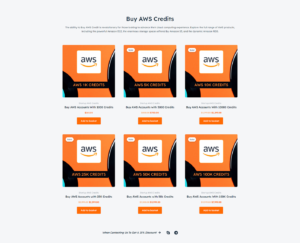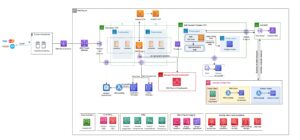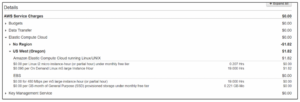AWS requires your credit card for identity verification and to charge for any incurred usage fees. This is a standard practice for most cloud service providers, including AWS.
Providing your credit card information allows AWS to verify your identity and ensures that you are a legitimate user of their services. Additionally, it allows AWS to charge you for any usage fees or additional services that may not be covered by the free tier.
While it may seem unnecessary, this process is in place to protect both AWS and its users from potential misuse of their services. Rest assured that your credit card information will be handled securely and will only be used for billing purposes as outlined in their privacy policy.
Introduction To Aws And Cloud Services
To use AWS cloud services, you need to provide your credit card details. This is necessary for billing purposes as you only pay for what you use. Your card won’t be charged unless you exceed the free tier usage limits.
The Rise Of Cloud Computing
Cloud computing has revolutionized the way businesses store, manage, and access their data. As technology continues to advance, the demand for scalable and flexible computing resources has grown exponentially. This has led to the rise of cloud computing, a paradigm shift that allows companies to utilize virtualized resources over the internet.
Traditional on-premises infrastructure often posed limitations in terms of scalability, cost-effectiveness, and accessibility. With cloud computing, businesses can now leverage the power of remote servers to store and process their data, accessing it from anywhere in the world.
Cloud computing offers a wide range of benefits, including reduced infrastructure costs, increased flexibility, improved collaboration, and enhanced security. By migrating to the cloud, companies can focus on their core competencies while leaving the management of hardware and software to cloud service providers.
Aws In The Cloud Ecosystem
When it comes to cloud computing, Amazon Web Services (AWS) is a leading player in the market. Launched in 2006, AWS provides a comprehensive suite of cloud services that cater to the needs of businesses of all sizes. From startups to large enterprises, AWS offers a scalable and cost-effective platform that enables organizations to innovate and grow.
As part of the cloud ecosystem, AWS offers a wide range of services, including compute power, storage, databases, networking, analytics, machine learning, and more. These services are designed to be highly flexible, allowing businesses to scale up or down based on their requirements.
AWS’s infrastructure is built on a global scale, with data centers located in various regions around the world. This allows businesses to deploy their applications and services closer to their end-users, reducing latency and improving performance.
Why Does Aws Need My Credit Card
When signing up for AWS, you may wonder why they require your credit card information. This is a common practice among cloud service providers, including AWS, for several reasons:
- Verification: By requesting your credit card details, AWS can verify your identity and ensure that you are a legitimate user. This helps to prevent fraudulent activities and maintain the integrity of their services.
- Payment method: AWS uses your credit card as a payment method for the services you consume. The credit card is linked to your AWS account, allowing them to charge you for the resources you use based on their pricing model.
- Free tier eligibility: AWS offers a free tier with limited resources for new users. By providing your credit card information, AWS can verify your eligibility for the free tier and ensure that you receive the appropriate benefits.
- Upgrade options: In case you decide to upgrade your AWS services or exceed the limits of the free tier, having your credit card information on file allows for a seamless transition. AWS can automatically charge you for the additional resources or services you require.
It’s important to note that AWS takes the security of your credit card information seriously. They follow industry-standard practices to protect your data and comply with relevant regulations.
The Role Of Credit Cards In Aws Sign-up
The Role of Credit Cards in AWS Sign-Up
Initial Account Creation
When creating an AWS account, a credit card is required for verification and security purposes. It ensures that the user is a real person and helps prevent fraudulent activities. The process of providing a credit card during the initial sign-up is a standard practice for many online services, including AWS.
Verification And Fraud Prevention
By providing a credit card during sign-up, AWS can verify the user’s identity and prevent fraudulent account creations. This helps maintain the security and integrity of the AWS platform, protecting both the company and its customers from potential misuse of the services.
Breaking Down Aws Free Tier
To access the AWS Free Tier, users are required to provide their credit card information. This is because the free tier is not a completely free service and users may incur charges beyond the free tier limits. It is important to carefully monitor usage to avoid unexpected charges.
Breaking Down AWS Free Tier When it comes to cloud computing services, Amazon Web Services (AWS) is one of the most popular and widely used platforms. AWS offers a Free Tier account that allows users to access a range of services without charge. However, to sign up for the Free Tier, AWS requires users to provide their credit card details. In this article, we will explain why AWS needs your credit card information and breakdown the Free Tier limits to help you understand what you can and cannot do with the Free Tier account. Understanding the Free Tier limits AWS Free Tier provides users with a set of services that are available at no cost for a certain period of time. The Free Tier account is designed to give users an opportunity to try out AWS services before committing to a paid plan. The Free Tier account offers a limited amount of resources, and if you exceed those limits, you will be charged for the additional usage. Here are some of the key points to keep in mind when it comes to the Free Tier limits:Ec2 Instance Limits
The Free Tier account allows users to launch up to 750 hours of Amazon EC2 instances per month. This limit is calculated based on the total number of hours that your instances run during the month. The Free Tier also provides 30GB of Amazon Elastic Block Storage (EBS) for free.Limits On Other Services
The Free Tier account also provides users with a limited amount of usage for other AWS services. For example, users can send up to 62,000 emails per month for free using Amazon SES, and they can store up to 5GB of data in Amazon S3 for free. Common misconceptions There are some common misconceptions about the AWS Free Tier that are worth mentioning. Here are a few of them:Credit Card Information
One of the most common misconceptions about the AWS Free Tier is that users are required to pay for the services they use. However, as mentioned earlier, AWS only requires users to provide their credit card information to verify their identity and to ensure that they are not abusing the Free Tier account.Unlimited Usage
Another misconception is that users have unlimited usage of the Free Tier services. However, as explained earlier, the Free Tier account has limits on the amount of resources that can be used. If you exceed those limits, you will be charged for the additional usage.Expiration
Finally, some users believe that the Free Tier account expires after a certain period of time. However, the Free Tier account remains active until you decide to cancel it or until you exceed the usage limits. In conclusion, AWS Free Tier is a great way to test out AWS services without committing to a paid plan. By understanding the Free Tier limits and common misconceptions, users can make the most of their Free Tier account and avoid unexpected charges. Remember that AWS only requires your credit card information to verify your identity and to prevent abuse of the Free Tier account.
Credit: m.youtube.com
Cost Management And Billing
To ensure seamless cost management and billing, AWS requires your credit card for accurate and timely payment processing. This allows for the efficient utilization of AWS services while providing a hassle-free billing experience.
As a cloud computing service, AWS offers a range of services that can help businesses achieve their goals. However, one of the concerns that customers may have is why AWS requires their credit card information. In this section, we’ll discuss the importance of cost management and billing, and how AWS uses your credit card information to provide you with the best possible service.Tracking Your Aws Usage
When you sign up for AWS services, you need to provide your credit card information. This information is used to track your usage of AWS services and ensure that you are billed accurately. AWS provides a detailed breakdown of your usage, which includes the amount of data stored, the number of requests made, and the duration of your usage. This helps you to understand how much you are spending on AWS services and to identify areas where you can optimize your usage to reduce costs.Setting Up Alerts And Budgets
AWS also provides tools that help you to manage your costs effectively. You can set up alerts and budgets to receive notifications when you reach a certain usage threshold. This helps you to avoid unexpected bills and to manage your costs effectively. You can also set up budgets to control your spending and to ensure that you stay within your budget limits. In conclusion, providing your credit card information to AWS is essential for cost management and billing. It allows you to track your usage, set up alerts and budgets, and manage your costs effectively. By using these tools, you can optimize your usage of AWS services and ensure that you get the best possible value for your money.Aws Pricing Models Explained
When it comes to using Amazon Web Services (AWS), understanding the pricing models is crucial. AWS offers various pricing options to suit different business needs. In this article, we will delve into the three main pricing models: Pay-as-you-go, Reserved Instances, and Spot Instances. By exploring these pricing models, you will gain a better understanding of how AWS charges for its services and why it requires your credit card information.
Pay-as-you-go
The Pay-as-you-go pricing model is the most flexible option offered by AWS. It allows you to pay for the computing resources you use, without any upfront costs or long-term commitments. With this model, you are billed on an hourly or per-second basis for the services you consume.
This pricing model is ideal for businesses with fluctuating workloads or those who want to test the waters with AWS services. It provides the freedom to scale up or down as needed, making it cost-effective and efficient. By providing your credit card details, AWS can automatically charge you for the resources you consume, ensuring a seamless and uninterrupted experience.
Reserved Instances
Reserved Instances (RIs) offer a discounted pricing model for customers who can commit to using AWS resources for a specified period. With RIs, you pay an upfront fee and receive a significant discount on the hourly usage rate. This model is suitable for businesses that have predictable workloads and can commit to using AWS for a longer duration.
By offering your credit card information, AWS can charge you for the upfront fee and ensure that you receive the discounted pricing for the specified time. This pricing model allows businesses to save costs in the long run and ensures stability for their AWS infrastructure.
Spot Instances
Spot Instances are an excellent option for businesses that have flexible workloads and are willing to bid for unused AWS computing capacity. With Spot Instances, you can take advantage of unused resources at significantly lower prices compared to the On-Demand or Reserved Instance pricing models.
However, the availability of Spot Instances is not guaranteed, as AWS can terminate them when the demand for resources increases. By providing your credit card details, AWS can charge you for the Spot Instances you use, ensuring a seamless experience and allowing you to take advantage of cost savings.
In conclusion, AWS offers different pricing models to cater to various business needs. Whether you opt for the Pay-as-you-go, Reserved Instances, or Spot Instances model, providing your credit card information allows AWS to charge you accurately for the services you consume. Understanding these pricing models will help you make informed decisions and optimize costs while harnessing the power of AWS.

Credit: aws.amazon.com
Security Measures For Your Payment Information
AWS takes the security of your payment information seriously. They require your credit card details to ensure a secure and reliable payment process, implementing robust security measures to protect your sensitive data from unauthorized access and potential fraud. Rest assured, AWS prioritizes the safety and confidentiality of your financial information.
Aws Security Protocols
AWS implements robust security protocols to safeguard your payment information.
How To Protect Your Account
Ensure your account is secure by following these best practices:
- Use strong passwords containing a mix of letters, numbers, and symbols.
- Enable multi-factor authentication for an extra layer of security.
- Regularly monitor your account for any suspicious activity.
Alternatives To Credit Card Payments
When using AWS services, providing a credit card is standard practice. However, there are alternatives for those who prefer not to use a credit card.
Debit Cards And Bank Transfers
Debit cards can be a convenient alternative to credit cards for AWS payments. Bank transfers are also accepted as a secure method of payment.
Aws Marketplace Options
Another alternative is to utilize the AWS Marketplace for payment. This platform offers various payment options beyond credit cards, catering to diverse preferences.
Case Studies: Aws Billing Surprises
When using AWS services, your credit card is required for billing purposes. AWS may surprise you with unexpected charges, making it crucial to monitor your usage and set up billing alerts to avoid any unwelcome financial surprises.
Learning from unexpected charges can help you manage costs better.
Best Practices For Cost Management:
1. Monitor usage regularly to avoid surprises.
2. Set up billing alerts for cost control.
3. Utilize AWS cost management tools effectively.
Navigating Aws Support For Billing Issues
Encountering billing issues on AWS can be frustrating, but knowing how to navigate AWS support for such matters can help alleviate your concerns. Whether it’s disputing charges or seeking refunds, AWS offers various avenues to address your billing concerns effectively.
Contacting Aws Support
- Access AWS Support through the AWS Management Console.
- Submit a support ticket outlining your billing query.
- Expect timely responses from AWS support representatives.
Disputing Charges And Seeking Refunds
- Review your billing details to identify any discrepancies.
- Contact AWS support to dispute erroneous charges.
- Provide necessary documentation to support your claim.
- Request refunds for valid billing errors promptly.

Credit: m.youtube.com
Conclusion: Maximizing Aws While Minimizing Costs
To maximize AWS while minimizing costs, users may be required to provide their credit card information. This is necessary for AWS to ensure proper billing and usage tracking, allowing users to access the full range of services while maintaining cost efficiency.
Rest assured, AWS takes the necessary security measures to protect sensitive payment information.
Leveraging Aws For Growth
When it comes to maximizing the potential of your business, leveraging AWS can be a game-changer. With its vast array of services and infrastructure, AWS provides the scalability and flexibility needed for growth. By utilizing AWS, businesses can easily scale their operations, expand their customer base, and enter new markets.
One of the key benefits of AWS is its ability to handle high levels of traffic and data. Whether you have a small website or a large e-commerce platform, AWS can handle the demands of your business. With AWS, you can ensure that your website or application is always available and responsive, providing a seamless experience to your users.
Moreover, AWS offers a wide range of tools and services that can help businesses improve their efficiency and productivity. From automated backups and disaster recovery solutions to machine learning capabilities and data analytics, AWS provides the tools needed to streamline operations and make data-driven decisions.
Staying Vigilant About Costs
While AWS offers incredible benefits, it’s important to stay vigilant about costs to ensure that you are maximizing your investment. AWS operates on a pay-as-you-go model, which means that you only pay for the services and resources you use. However, it’s essential to monitor your usage and optimize your infrastructure to minimize unnecessary costs.
By regularly reviewing your AWS usage and implementing cost optimization strategies, you can significantly reduce your expenses. This includes rightsizing your instances, utilizing AWS cost management tools, and leveraging spot instances for non-critical workloads. Additionally, AWS offers pricing options such as Reserved Instances and Savings Plans, which can provide substantial savings for long-term commitments.
It’s also crucial to implement proper monitoring and tagging practices to gain visibility into your costs. By tagging your resources and setting up billing alarms, you can easily track your expenses and identify areas where optimization is required. Regularly reviewing your cost reports and implementing cost allocation tags can help you allocate costs accurately and make informed decisions about your infrastructure.
In conclusion, AWS offers tremendous potential for growth and scalability, but it’s essential to stay vigilant about costs. By leveraging AWS for your business and implementing cost optimization strategies, you can maximize your investment and ensure that you are getting the most value out of your AWS resources.
Frequently Asked Questions
Why Is Aws Asking For A Credit Card?
AWS requires a credit card for account verification and to charge for any services used. This helps prevent misuse and ensures a seamless experience.
Can I Create A Free Aws Account Without Credit Card?
Yes, you can create a free AWS account without a credit card.
Can I Remove Credit Card From Aws?
Yes, you can remove your credit card from AWS. Simply log in to your AWS account, go to the Billing and Cost Management console, select Payment Methods, and remove the credit card you want to delete.
Does Aws Automatically Charge Credit Card?
Yes, AWS automatically charges the credit card you have on file for any incurred fees.
Conclusion
Providing your credit card information to AWS is a necessary step to access their services. It helps ensure a smooth and secure billing process, as well as enables you to take full advantage of the platform’s capabilities. While some may have concerns about sharing this sensitive information, AWS has implemented robust security measures to protect your data.
By understanding the reasons behind this requirement, you can confidently utilize AWS for your business needs.






